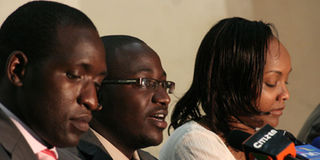Doctors issue strike threat over low pay

Photo/PHOEBE OKALL/NATION
Kenya medical practitioners, pharmacists and dentists union (KMPDU) secretary general Dr Boniface Chitayi (centre), national Treasurer Dr Wambui Waithaka (right) and chairman Dr Victor Ng'ani during a press conference on November 19, 2011.
Doctors in public hospitals are demanding a 400 percent pay increment.
This will see the salary of the lowest paid officer rise from Sh60,000 to Sh240,00.
The highest paid doctor will take home Sh520,000, up from Sh130,000.
This is one of the resolutions by the Kenya Medical Practitioners, Pharmacists and Dentists Union (KMPDU), which has threatened to call a strike over poor terms of service.
The union also wants its members compensated for working at odd hours.
“We have passed a resolution to go on strike with effect from December 5 following futile attempts by our union to discuss the matter with the government,” KMPDU secretary general Boniface Chitayi said at the weekend.
“If our demands are not met, doctors will stay at home. There will be no any emergency calls. But we are open to talks with the government to avert a crisis.”
He said unlike other public servants, doctors do not have a risk allowance despite working under tough conditions such as exposure to infections, radiation and even assault by mentally unstable patients.
“But the irony is that doctors offer services which they cannot themselves afford,” warned the unionist. He said doctors were paid a medical allowance of Sh1,740 per month, which is the lowest among the professional cadres in public service.
Dr Chitayi spoke at a special delegates conference in Nairobi where it was claimed that the health sector was worse off than 20 years ago.
For instance, death of children below one month in 1990 was 452 per 100,000 live births, compared to 530 today.
Dr Chitayi said the county had a shortage of 40,000 doctors.
The World Health Organisation recommends a doctor for every 1,000 people.
“Even Vision 2030 has outlined healthcare as a key area that should be developed,” said Dr Chitayi.




